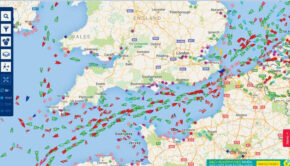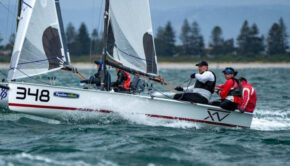A conversation about licensing
Published on August 20th, 2019
When it’s incumbent for powerboats to give way to sailboats, is the level of skill sufficient to fulfill the obligation? Robert Dunbar isn’t so sure as he shares in this report:
For years I’ve had this beef that there are many unqualified “captains” out there that should simply not be allowed to take command of a vessel and often give power boaters a bad name.
When the only licensing required to operate a power boat is to successfully pass an online quiz to get a safe boating certificate to placate the Canadian government, it is more a cash grab than effective education when anybody can pass because it’s akin to an open book quiz in high school.
Once in possession of the certificate, the holder can then go to the nearest dealer and purchase a boat even though the buyer has little to no practical experience and often go for the sleek and fast mosquito boat (because they’re that damn annoying).
I often equate it to trying to fly an airplane without even attending ground school let alone having a few test flights and the all-important solo flight to be properly licensed. However, it’s not that easy as a friend of mine who is a commercial pilot describes:
“Flying an airplane and driving a boat are more similar then people may think. Both require much skill and training. I am a Captain on a commercial airliner but I have no experience when it comes to boating. With that said, there is no way I would feel comfortable going out and buying a boat and just hitting the open water. As nice as it would be, I know better.
“I am professionally trained to fly airplanes, I’ve spent over $70,000 in licensing and ratings. I know very well how weather works, I know how to operate high performance machinery and safely follow very specific rules of the air. To become a pilot in Canada there are many steps you have to take.
“You need to get a CAT 3 medical to become a private pilot (CAT 1 for commercial license). You then must attend many hours of ground school that is broken down into many subjects like Navigation, Meteorology, Systems, Air Law, and many more. You must also follow a specific lesson plan where you fly exercises with an instructor or go solo once you reach that level until you meet the hourly requirements to then complete a flight test with a qualified Examiner.
“The pass mark for all the written exams is 70% and the flight test will cover all items set out by a flight test guide provided by Transport Canada. The flight test is almost two full hours of flying and doing maneuvers all while being held to a minimum standard. It’s not easy for a new pilot.
“Once you receive your private pilot’s license you are able to fly a single engine light aeroplane. This cost me around $16,000 to achieve. After that if you want to fly at night you must attain a night rating, once again more ground school, more flight instruction and more money (around $7,000). At this point if you were planning to go further as a pilot you must work on becoming a commercial pilot, meaning being allowed to work as a pilot.
“Once again harder exams, more flight training and another flight test held to tougher standards. If you want to fly a plane with more than one engine then you must also get a multi engine rating. This requires ground school, more flight training, and yet another fight test. After that, a pilot seeking a career of flying would have to get an instrument rating to allow flying in almost all weather conditions.
“By the time you finish all this training you have around 200 hours flight time. After all of that, and once you start working in the industry, each large aircraft you fly will require another rating for its type called a type rating.
“While knowing that each pilot out there flying in Canada must have met these standards does allow for some comfort, the idea that boaters are not held to a similar system of training makes me wonder how safe boating can actually be.”
On August 12 the global sailing community was shaken by the death of Sandra Tartaglino at the 2019 New England 100 Regatta who was hit by a power boat throwing her overboard during a race. Why on earth is a pleasure boat operating in a race course of that magnitude?
This comes on the heels of an incident I faced a few days prior while traversing the narrows of Halifax Harbour where the infamous Halifax Explosion took place.
While basking in the sun and ambience of this historical area my eyes glimpsed a power boat and my inherent distrust of power boaters (I prefer the term prop jocks) piqued. We were on course for a head on collision and the “captain” was not signalling any intention to alter course from my bow . As we drew closer I was convinced that the boat was on autopilot and nobody was on active watch.
Now there’s a difference between being right and ‘dead right’. With separation of approximately 250-300 feet I took it upon myself to tack to get out of the path of the oncoming power boat and then quickly tack again to keep clear of some tugs and barges working at the Irving Shipyard.
When the power boat and I safely passed the occupants casually waved a friendly “hello” to me completely oblivious of their incompetence. I was shocked to see people on watch as I was convinced the vessel was on autopilot!
Ironically this incident took place within metres of the local Coast Guard Station and took it upon myself to ask a Coast Guard member their thoughts on reckless power boaters. The member I got in touch with did not hold back any punches when I asked about the competence of prop jocks he’s had to rescue.
“I find that sailors know the Colregs better but the whole Right of Way thing is dangerous if misinterpreted. With regards to pleasure power boaters, THEY’RE ALL IDIOTS! The safe boating ticket is a joke………it’s to cover the asses so we can allow idiots to buy into the dream of pleasure boating……did you know that most jet ski rentals don’t even care if you have it? As long as you’re renting with a credit card you’re insured.”
Many years ago when I worked for a sailboat dealer there were a few occasions when a couple would approach me to purchase a boat. My first question was always “How much sailing experience do you have?” On one particular occasion a couple came to office with no sailing experience and wanted to purchase a 26 ft. boat.
I took it upon myself to send them to a sailing school rather than to the show room. To the contrary though I’ve spoken to power boat dealers and all that’s really needed is the safe boating card and a lot of money.
The laws regarding drinking and boating are said to be no different than drinking and driving a motor vehicle. However, it is my opinion that prior to purchasing a boat, either sail or power, the buyer should have proof of passing a course of the safe operation of boat akin to obtaining a car license.
Furthermore, as either the horsepower or size of vessel increases, the owner must obtain the proper rating similar to a commercial airline pilot.









 We’ll keep your information safe.
We’ll keep your information safe.